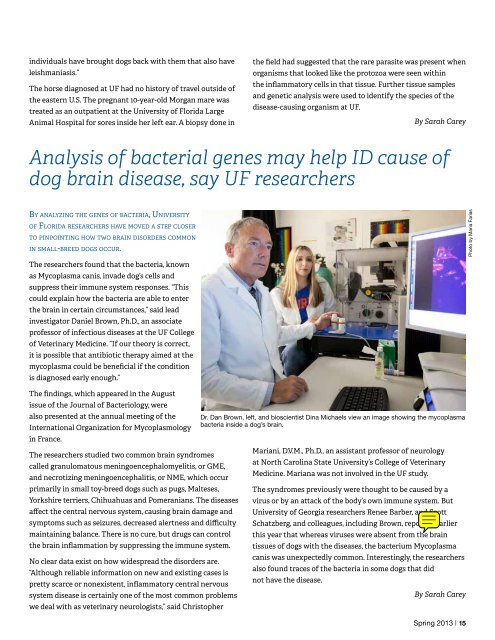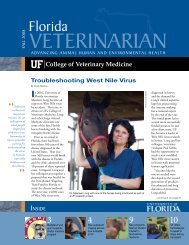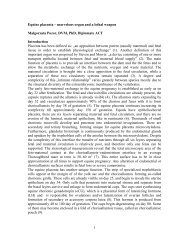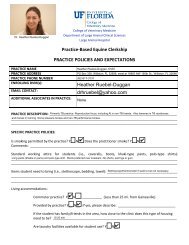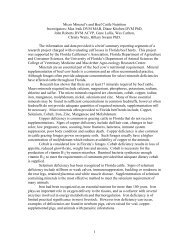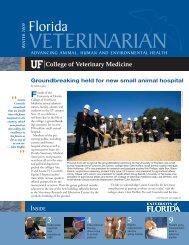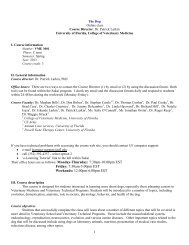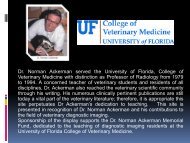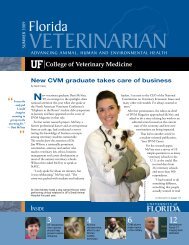Research UpdateRare human parasite found in U.S. horse for thefirst time, UF researchers reportA rare, potentially fatal species <strong>of</strong> parasite never beforefound in North America has been identified in a <strong>Florida</strong>horse.<strong>University</strong> <strong>of</strong> <strong>Florida</strong> veterinarians identified the parasite,called Leishmania siamensis, in the summer <strong>of</strong> 2011. Thisparticular species <strong>of</strong> parasite previously had been foundonly in Thailand and parts <strong>of</strong> Europe while other species <strong>of</strong>Leishmania have been found all over the world. No Leishmaniainfections <strong>of</strong> any species had been previously reported in ahorse native to the United States.The UF discovery raises awareness <strong>of</strong> how widespread theparasite is and suggests a need for watchfulness regardingpotential transmission to humans, the researchers said.“We now know the parasites that cause this disease also existhere in the U.S. and that we have some insect, presumably thesandfly, that is capable <strong>of</strong> transmitting the disease,” said SarahReuss, V.M.D., a clinical assistant pr<strong>of</strong>essor <strong>of</strong> large animalmedicine at the UF <strong>College</strong> <strong>of</strong> <strong>Veterinary</strong> <strong>Medicine</strong>, who alongwith UF colleagues and a private practice clinical pathologistdescribed the findings in the September issue <strong>of</strong> EmergingInfectious Diseases, a journal <strong>of</strong> the Centers for DiseaseControl and Prevention. “Our findings raise several potentialavenues <strong>of</strong> further investigation, including the prevalence <strong>of</strong>this disease in horses in the U.S., a better understanding <strong>of</strong> thesandfly life cycle and the potential <strong>of</strong> this leishmaniasis speciesto be transmitted from animals to humans.”Leishmaniasis is a parasitic infection spread through the bites<strong>of</strong> infected sandflies. The disease shows up most commonlyin two forms: cutaneous, which causes sores on the skin, isself-healing; and visceral, the most severe form, which affectsthe entire body and is almost always fatal if left untreated.After malaria, leishmaniasis is the leading parasitic cause<strong>of</strong> death in humans. The disease has been found in fourcontinents and is considered to be endemic in 88 countries,including 16 developed nations, according to the World HealthOrganization. The WHO estimates the worldwide prevalenceat 12 million cases, with about 350 million people at risk <strong>of</strong>infection and about 60,000 people dying from the disease eachyear. Leishmaniasis is rare in people in the U.S.“It really hasn’t been a disease that has affected Americans, butthere are really good data with climate change models thatpredict sandfly ranges will expand, making this disease muchmore <strong>of</strong> a threat because <strong>of</strong> global warming,” said co-authorJames Wellehan Jr., D.V.M., Ph.D., a veterinarian from the UFresearch team, who confirmed the presence <strong>of</strong> the disease inthe <strong>Florida</strong> horse by analyzing the genes <strong>of</strong> the parasite.Photo by Maria FariasThe visceral form <strong>of</strong> leishmaniasis is endemicin foxhounds in the U.S, associated with adifferent species <strong>of</strong> Leishmania. But aside fromsome regional transmission in the Southwest,most <strong>of</strong> the cases <strong>of</strong> skin infection due toleishmaniasis in the U.S. are believed to haveoccurred in animals brought in from countrieswhere the disease is common, or in people whohad recently spent time in those countries.Dr. Sarah Reuss, right, shows the part <strong>of</strong> a horse’s ear where sores later confirmed to becaused by leishmania siamensis were seen and treated at UF in August 2011. The horse inthis photo was not affected by the disease. Dr. Jim Wellehan, left, looks on.“Thousands <strong>of</strong> people serving in the U.S.military have returned from Iraq andAfghanistan with cutaneous or visceralleishmaniasis,” said Christine Petersen, D.V.M.,Ph.D., an associate pr<strong>of</strong>essor <strong>of</strong> veterinarypathology at Iowa State <strong>University</strong>’s <strong>College</strong><strong>of</strong> <strong>Veterinary</strong> <strong>Medicine</strong> and an expert onLeishmania transmission, immune responsesand veterinary disease, who was notinvolved in the study. “In a few cases, these14 | <strong>Florida</strong> <strong>Veterinarian</strong>
individuals have brought dogs back with them that also haveleishmaniasis.”The horse diagnosed at UF had no history <strong>of</strong> travel outside <strong>of</strong>the eastern U.S. The pregnant 10-year-old Morgan mare wastreated as an outpatient at the <strong>University</strong> <strong>of</strong> <strong>Florida</strong> LargeAnimal Hospital for sores inside her left ear. A biopsy done inthe field had suggested that the rare parasite was present whenorganisms that looked like the protozoa were seen withinthe inflammatory cells in that tissue. Further tissue samplesand genetic analysis were used to identify the species <strong>of</strong> thedisease-causing organism at UF.By Sarah CareyAnalysis <strong>of</strong> bacterial genes may help ID cause <strong>of</strong>dog brain disease, say UF researchersBy analyzing the genes <strong>of</strong> bacteria, <strong>University</strong><strong>of</strong> <strong>Florida</strong> researchers have moved a step closerto pinpointing how two brain disorders commonin small-breed dogs occur.The researchers found that the bacteria, knownas Mycoplasma canis, invade dog’s cells andsuppress their immune system responses. “Thiscould explain how the bacteria are able to enterthe brain in certain circumstances,” said leadinvestigator Daniel Brown, Ph.D., an associatepr<strong>of</strong>essor <strong>of</strong> infectious diseases at the UF <strong>College</strong><strong>of</strong> <strong>Veterinary</strong> <strong>Medicine</strong>. “If our theory is correct,it is possible that antibiotic therapy aimed at themycoplasma could be beneficial if the conditionis diagnosed early enough.”Photo by Maria FariasThe findings, which appeared in the Augustissue <strong>of</strong> the Journal <strong>of</strong> Bacteriology, werealso presented at the annual meeting <strong>of</strong> theInternational Organization for Mycoplasmologyin France.The researchers studied two common brain syndromescalled granulomatous meningoencephalomyelitis, or GME,and necrotizing meningoencephalitis, or NME, which occurprimarily in small toy-breed dogs such as pugs, Malteses,Yorkshire terriers, Chihuahuas and Pomeranians. The diseasesaffect the central nervous system, causing brain damage andsymptoms such as seizures, decreased alertness and difficultymaintaining balance. There is no cure, but drugs can controlthe brain inflammation by suppressing the immune system.No clear data exist on how widespread the disorders are.“Although reliable information on new and existing cases ispretty scarce or nonexistent, inflammatory central nervoussystem disease is certainly one <strong>of</strong> the most common problemswe deal with as veterinary neurologists,” said ChristopherDr. Dan Brown, left, and bioscientist Dina Michaels view an image showing the mycoplasmabacteria inside a dog’s brain.Mariani, D.V.M., Ph.D., an assistant pr<strong>of</strong>essor <strong>of</strong> neurologyat North Carolina State <strong>University</strong>’s <strong>College</strong> <strong>of</strong> <strong>Veterinary</strong><strong>Medicine</strong>. Mariana was not involved in the UF study.The syndromes previously were thought to be caused by avirus or by an attack <strong>of</strong> the body’s own immune system. But<strong>University</strong> <strong>of</strong> Georgia researchers Renee Barber, and ScottSchatzberg, and colleagues, including Brown, reported earlierthis year that whereas viruses were absent from the braintissues <strong>of</strong> dogs with the diseases, the bacterium Mycoplasmacanis was unexpectedly common. Interestingly, the researchersalso found traces <strong>of</strong> the bacteria in some dogs that didnot have the disease.By Sarah CareySpring 2013 | 15


